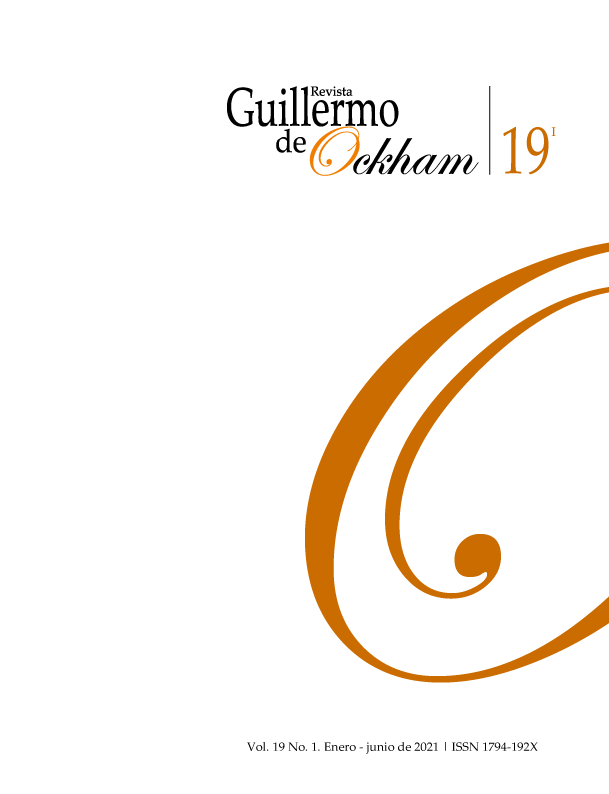The Revista Guillermo de Ockham provides an immediate and open access to its content, based on the principle of offering the public a free access to investigations to provide a global interchange of knowledge.
Unless otherwise established, the contents of this journal has a license with Creative Commons Attribution-NonCommercial-NoDerivatives 4.0 International (CC BY-NC-ND 4.0) http://creativecommons.org/licenses/by-nc-nd/4.0/
- Attribution: You must give appropriate credit, provide a link to the license, and indicate if changes were made. You may do so in any reasonable manner, but not in any way that suggests the licensor endorses you or your use.
- NonCommercial: You may not use the material for commercial purposes.
- NoDerivatives: If you remix, transform, or build upon the material, you may not distribute the modified material.
- No additional restrictions: You may not apply legal terms or technological measures that legally restrict others from doing anything the license permits.
Abstract
This article aims to reflect on the foundation of education from a movement of thought that is oriented on finite. For this he takes categories such as Heideggerian Dasein, mainly the existential being-for-death, and Sartrean for-himself, which, with all its nuances, take the being from its own forgetfulness and allow a pedagogical reflection that welcomes finite as an alternative to maintain the open state of existence. Through a hermeneutical exercise, some concepts of existential philosophy were linked to a diagnosis of education on the horizon of forgetting being, envisioning in turn an exercise of foundation, which broadens the horizon to think about it and transform it.
References
Cassirer, E. (2013). Filosofía de la Ilustración. (E. Ímaz, Trad.). México: Fondo de Cultura Económica.
Escudero, A. (2009). El tiempo del sujeto. Un diagnóstico de la crisis de la modernidad. Madrid: Arena Libros.
Escudero, J. (2010). Heidegger y la genealogía de la pregunta por el ser. Una articulación temática y metodológica de su obra temprana. Barcelona: Herder.
Esquirol, J. (2011). Los filósofos contemporáneos y la técnica. De Ortega a Sloterdijk. Barcelona: Gedisa.
Glucksmann, A. (2010). Los dos caminos de la filosofía: Sócrates y Heidegger: ideas para un tiempo trágico. (N. Viver Barri, Trad.). Barcelona: TusQuets.
Grondin, J. (2006). Introducción a la metafísica. (A. Martínez Riu, Trad.). Barcelona: Herder.
Habermas, J. (2017). El discurso filosófico de la modernidad. (M. Jiménez Redondo, Trad.). Bogotá: Katz.
Heidegger, Ma. (1960). Carta sobre el humanismo. (A. Wagner de Reyna, Trad.). Buenos Aires: Sur.
Heidegger, M. (2005). Acerca del evento. (D. V. Picotti, Trad.). Buenos Aires: Biblos.
Heidegger, M. (2014). Ser y tiempo. (J. E. Rivera Cruchaga, Trad.). Madrid: Trotta.
Klocker, D. (2013). Fundamento y abismo. En torno al cuestionamiento del fundamento en el círculo de “Ser y tiempo” de Martin Heidegger. Buenos Aires: Biblos.
Másmela, C. (2000). Martin Heidegger: El tiempo del Ser. Madrid: Trotta.
Mèlich, J.-C. (2002). Filosofía de la finitud. Barcelona: Herder.
Rojas Osorio, C. (2010). Filosofía de la educación. De los griegos a la tardomodernidad. Medellín: Universidad de Antioquia.
Sartre, J.-P. (1996). Verdad y existencia. (A. Puleo, Trad.). Barcelona: Paidós.
Sartre, J.-P. (2008). El ser y la nada: Ensayo de ontología fenomenológica. (J. Valmar, Trad.). Buenos Aires: Losada.
Vattimo, G. (2006). Introducción a Heidegger. (A. Báez, Trad.). Barcelona: Gedisa.
Volpi, F. (2005). El nihilismo. (C. del Rosso y A. Vigo, Trad.). Buenos Aires: Biblos.

































